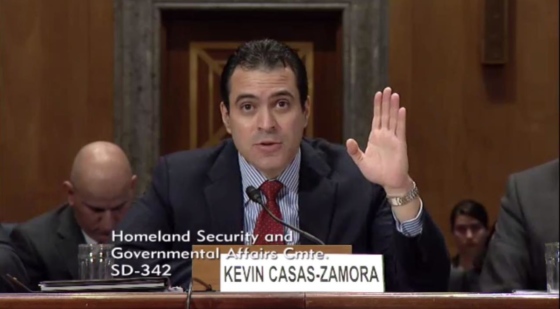The “Other” Latin America
The formal launching of CELAC revealed the strength of regionalism in Latin America.
A Daily Publication of The Dialogue
El Salvador would benefit from a lending program with the International Monetary Fund, or IMF, given the weakened state of its finances, Moody’s Investors Service said in May. Earlier in the month, the ratings agency cut Salvadoran sovereign debt by two notches to Caa3, the agency’s third-lowest rating, due to “an increased probability of a credit event.” The IMF has been in talks with the Central American country’s government about several issues, including fiscal transparency and public fund accountability. How likely are El Salvador and the IMF to reach an agreement, and how could one benefit the country’s economy? What factors are shaping the possibility of a credit “event” in El Salvador? How significant has private investment been in the Central American country’s economic stability, which last year saw its highest levels of private investment in six decades?
Ilan Goldfajn, director of the Western Hemisphere Department at the International Monetary Fund: “IMF staff and Salvadoran authorities continue having regular discussions on key policy issues, including the pace and composition of fiscal measures while supporting growth and protecting vulnerable segments of the population. Our technical teams are also engaged in discussions around anti-money laundering, fiscal transparency, accountability in the use of public funds and strengthening the anti-corruption framework in line with international standards, as well as ways to minimize the risks arising from the country’s adoption of Bitcoin as a legal tender. Our goal is to help El Salvador and its people ensure stronger and more inclusive growth.”
Brendan McKenna, vice president and international economist at Wells Fargo Securities: “The likelihood of El Salvador securing an IMF program is rather low as of now. IMF officials have been very explicit in encouraging El Salvador to permanently reduce the fiscal deficit and move away from using Bitcoin as a legal form of currency. President Bukele has essentially dismissed the fund’s recommendation to scale back the use of digital currency, while the government has done little to demonstrate a commitment to fiscal reform or place the sovereign debt burden on a more sustainable trajectory. Without a willingness to address these IMF concerns and pre-conditions, I think the possibility of reaching an agreement with the IMF is very low. However, should a program be secured, El Salvador could benefit by seeing public finances improve. A program would likely be designed to cut fiscal expenditures, reduce subsidies and over time lower the debt-to-GDP ratio. Right now, El Salvador’s debt burden is unsustainable as the government has put expansionary fiscal policies in place. Denominating foreign exchange reserves in Bitcoin has also significantly reduced external buffers and has left the government with little to no financial resources to service existing debt. Financial markets have noticed the deterioration in sovereign creditworthiness and pushed El Salvador’s bonds deep into distressed territory, signaling that a credit event could be imminent. To attract private investment, on which El Salvador’s economy has become increasingly reliant, a solid reform agenda and commitment to the agenda will need to be put in place. Unless public finances improve, the probability of default recedes and more credible and orthodox policymaking is implemented, receiving private investment will be extremely difficult.”
Ricardo Castaneda, senior economist and coordinator for El Salvador and Honduras at Instituto Centroamericano de Estudios Fiscales (Icefi): “El Salvador’s financial situation has been complicated for several years; however, with the weakening of democratic institutions, the lack of a fiscal plan and the adoption of Bitcoin, this situation has deteriorated. According to the Emerging Market Bond Index (EMBI), El Salvador now has the second-worst level in Latin America, below only Venezuela. To give an example, this means that if El Salvador had issued bonds in the international markets a year ago, the interest rate it would have paid would be between 7 percent or 8 percent. If it did so now, it would have to pay around 30 percent, assuming that someone were to lend it money. That is why it is urgent to reach an agreement with the IMF. However, this depends on whether the Salvadoran government accepts conditions on issues of transparency and democratic governance—aspects that I do not anticipate it will accept. Nevertheless, in January 2023 the government has to pay $800 million of maturing bonds, and at this point, they do not have the money to pay it, so that could be a compelling reason to accept the commitments with the IMF. But the fund must be careful not to become a partner that finances the consolidation of an authoritarian regime in the country.”
Siobhan Morden, managing director at Amherst Pierpoint Securities: “It’s clear that there is no IMF option. Despite more than a year of promises, there has been no progress toward a formal IMF program. The current distressed prices have completely unwound this option with no apparent goodwill from El Salvador to compromise on what’s necessary for a formal IMF program. The release of the Article IV review last January provides some valuable insight as well as recommendations. It’s a tough list, including a cumulative 4 percent of GDP fiscal adjustment (2022-2024), the reversal of Bitcoin as legal tender, as well as other good governance criteria. The latter recommendations may prove nonstarters. This is not to say that El Salvador cannot design its own credible medium-term economic program with fiscal discipline as an anchor. There are two potential paths toward debt sustainability in El Salvador: either fiscal discipline under their own IMF-style program or higher-trend GDP growth from either Bitcoin-related tourism or investment. The financing stress should eventually reveal whether the Bukele administration pivots toward fiscal discipline. The chronology of cash flow stress typically first exhausts financing options, then cuts back on spending and finally draws down the stock of assets. El Salvador is still in the early stages of what could be a protracted muddling-through on cashflow management. Bitcoin remains mostly a distraction and not a viable solution for either near-term financing or fiscal stress. It’s difficult to quantify the optionality of higher medium-term Bitcoin-related GDP growth that could stabilize the debt burden. Tourism has yet to recover to pre-Covid levels, while the weak policy framework remains a deterrent to foreign direct investment. The medium-term policy management remains undefined and hence explains the pessimism of the low bond prices and prospects for weak debt sustainability.”
 The Latin America Advisor features Q&A from leaders in politics, economics, and finance every business day. It is available to members of the Dialogue’s Corporate Program and others by subscription.
The Latin America Advisor features Q&A from leaders in politics, economics, and finance every business day. It is available to members of the Dialogue’s Corporate Program and others by subscription.
The formal launching of CELAC revealed the strength of regionalism in Latin America.
CONGRESSIONAL TESTIMONY AS SUBMITTED FOR RECORD AND DELIVERED BEFORE A FULL COMMITTEE HEARING OF THE US SENATE COMMITTEE ON HOMELAND SECURITY AND GOVERNMENT AFFAIRS. Over the past five years, slightly over 100,000 unaccompanied migrant children from Guatemala, Honduras and El Salvador have been apprehended at the US southern border. They are but…
During the last decade, there has been significant improvement in Salvadorans education, in an international context which reaffirms the importance of education as key strategy for the progress of nations. The Educational Reform, promoted since the 90s, has obtained initial achievements in expanding the access of education, improving quality of…
 The government of Salvadoran President Nayib Bukele would benefit from a lending deal with the International Monetary Fund, Moody’s said recently. But some commentators below point out that such a deal is far from certain. // File Photo: Salvadoran Government.
The government of Salvadoran President Nayib Bukele would benefit from a lending deal with the International Monetary Fund, Moody’s said recently. But some commentators below point out that such a deal is far from certain. // File Photo: Salvadoran Government.
 Video
Video